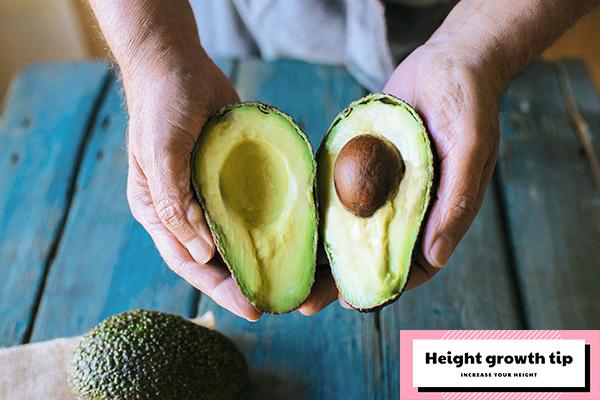Avocado, with its luxurious texture and delightful flavor, has captured the hearts of food enthusiasts for generations. But beyond its culinary appeal, this fruit has a long-standing reputation as a powerhouse of health benefits. However, a question often lingers in the minds of many: could avocados hold the secret to increasing one’s height? In this comprehensive article, we embark on a journey to uncover the hidden nutritional treasures locked within avocados, exploring their potential role in height augmentation.
Throughout our exploration, we’ll not only reveal the best ways to seamlessly incorporate avocados into your daily diet but also shine a light on the wide array of health advantages this versatile fruit has to offer. Additionally, we’ll address common inquiries and concerns surrounding avocado consumption and its potential impact on height enhancement. So, if you’ve ever wondered whether avocados might play a role in helping you reach greater heights, we invite you to join us on this enlightening gastronomic and nutritional adventure.
Is Avocado Consumption Linked to Height Growth?
From a scientific perspective, there is currently no concrete empirical evidence to suggest that the consumption of avocados on its own can directly result in an increase in height. An individual’s height is predominantly determined by their genetic makeup, and it is subject to various factors such as nutrition, overall health, and lifestyle choices. While avocados are unquestionably a nutritious fruit that offers a multitude of health benefits, including support for skeletal health, they do not possess the ability to significantly impact height growth in isolation.
It is essential to recognize that avocados are a rich source of essential nutrients crucial for overall growth and development. These nutrients encompass a wide range of vitamins, minerals, and healthy fats, which can certainly contribute to strengthening bone health and supporting optimal growth. However, they do not possess the inherent capability to surpass an individual’s genetically predetermined height potential.
To maximize one’s potential for reaching their ideal height, it is imperative to focus on a well-rounded diet that includes a diverse array of nutrient-rich foods. Additionally, engaging in regular physical activity, ensuring adequate sleep, and maintaining overall good health are essential components of the equation. These multifaceted factors, in conjunction with one’s genetic predisposition, collectively exert a profound influence on an individual’s height. For personalized guidance on dietary choices and lifestyle practices conducive to promoting healthy growth and development, it is always advisable to consult with healthcare professionals or nutritionists.

The Nutritional Benefits of Avocado:
Avocado truly shines as a nutritional powerhouse, offering a rich tapestry of essential vitamins, minerals, and beneficial fats that contribute to our overall well-being. When we take a deep dive into the nutritional profile of a medium-sized avocado (approximately 200 grams), we unearth a treasure trove of health benefits that deserve our attention and appreciation:
Healthy Fats: Avocado boasts an impressive concentration of monounsaturated fats, renowned for their protective effects on the heart. These fats play a pivotal role in reducing levels of LDL (the “bad” cholesterol) and mitigating the risk of heart disease. In fact, a medium-sized avocado contains approximately 20 grams of these heart-friendly fats.
Dietary Fiber: Avocado stands as a dependable source of dietary fiber, which plays a crucial role in promoting digestive health, nurturing the intricate ecosystem of our gut microbiome, and regulating blood sugar levels. Consuming a medium-sized avocado furnishes us with around 13 grams of dietary fiber.
Vitamins Galore: Avocado is brimming with an impressive array of vitamins, including:
- Vitamin K: This vitamin is essential for both blood clotting and maintaining strong and resilient bones.
- Vitamin C: A formidable antioxidant that fortifies our immune system and supports the production of collagen, the building block of healthy skin and connective tissues.
- Vitamin E: An influential antioxidant that diligently safeguards our cells from oxidative damage, aiding in the fight against the ravages of time and stress.
- B-vitamins: Among these, folate (or vitamin B9) plays a critical role in the growth and development of our cells.
Mineral Wealth: Avocado proudly boasts several vital minerals, including:
- Potassium: An indispensable element that preserves the optimal functioning of our heart and helps regulate blood pressure.
- Magnesium: A mineral that is essential for bone health, the proper function of our nerves, and the production of energy.
- Copper: This mineral is required for the production of red blood cells and the synthesis of collagen, the very fabric that holds our bodies together.
Additional Treasures: Avocado also provides us with modest amounts of other precious nutrients, such as antioxidants like lutein and zeaxanthin, which promote the well-being of our eyes.
The Impact of Avocado on Height:
It’s crucial to clarify that avocado does not exert a direct influence on height growth. An individual’s height is predominantly determined by their genetic makeup and influenced by a myriad of factors, including their overall nutrition, health, and lifestyle choices. While avocado is undeniably a nutritious fruit that furnishes essential nutrients vital for growth and development, it lacks specific properties capable of altering one’s height beyond their genetic predisposition.
However, the nutrients found in avocado, encompassing vitamins, minerals, and healthy fats, do play a role in supporting overall bone health, indirectly contributing to one’s height potential. Adequate nutrition, which includes a well-rounded intake of essential nutrients, is pivotal for proper bone development and growth. Avocado’s nutrient profile, particularly its elevated levels of vitamin K, vitamin C, potassium, and magnesium, contributes to the maintenance of bone density, the strengthening of cartilage, and the support of growth plates.
To maximize one’s height potential, it is essential to focus on a balanced diet that encompasses a wide variety of nutrient-rich foods, engage in regular exercise, ensure sufficient sleep, and maintain overall good health. These factors, in conjunction with genetic determinants, collectively shape an individual’s stature. While avocado can serve as a valuable component of a balanced diet, it should be regarded as part of an overarching healthy lifestyle, rather than a specific catalyst for height enhancement.
Is there a recommended daily amount of avocado consumption to promote height growth?
While there isn’t a specific daily quota for avocado consumption solely aimed at increasing one’s height, integrating half to a whole avocado into your daily diet can yield a multitude of health advantages, some of which are associated with bone health and potential growth enhancement.
The Health Benefits of Avocado:
Beyond its possible impact on height, avocado boasts a wide array of health benefits:
- Supports Digestive Health: Avocado is rich in dietary fiber, facilitating digestion and fostering a healthy gut microbiome.
- Reduces Heart Disease Risk: The monounsaturated fats found in avocados aid in maintaining healthy cholesterol levels and supporting overall cardiovascular well-being.
- Abounds in Antioxidants: Avocado contains antioxidants like lutein and zeaxanthin, which promote eye health and provide protection against age-related macular degeneration.
- Aids in Weight Management: The healthy fats and fiber content in avocados contribute to a sense of fullness, potentially assisting in weight control.
- May Lower Cancer Risk: Avocado contains antioxidants and phytochemicals that have been linked to a reduced risk of specific cancer types.
- Benefits Eye Health: The vitamins and antioxidants present in avocados are beneficial for overall eye health and may reduce the risk of conditions like cataracts and other eye disorders.
- Enhances Bone Health: Avocado’s combination of vitamins, minerals, and healthy fats supports bone health and may help reduce the risk of osteoporosis.
Incorporating avocado into a balanced diet can be a delicious and nutritious way to reap these health rewards, although it’s important to remember that height primarily depends on genetic factors and overall nutrition rather than one specific food item.

Does eating a lot of avocado cause side effects to health?
Although avocados are widely acknowledged as a nutritious food, indulging excessively in them can result in an excessive intake of calories and healthy fats, which may ultimately lead to weight gain. Therefore, it is crucial to integrate avocados into a well-rounded diet while remaining attentive to the overall calorie consumption.
In conclusion:
The incorporation of avocado into one’s daily dietary intake may not be a direct panacea for achieving greater height, but its multifaceted nutritional profile and its manifold benefits for overall well-being position it as a valuable component within a comprehensive nutritional regimen. Avocado, as nature’s bounty, serves as a reservoir of essential nutrients that are pivotal in fortifying bones and cartilage, which, in a cascading manner, can indirectly influence an individual’s potential for height augmentation. By seamlessly integrating avocado into a varied and well-rounded diet, individuals stand to relish its numerous health advantages, all while offering subtle support to their growth and holistic development.
Crucially, it is imperative to adopt a holistic perspective when embarking on the quest for height enhancement. One must judiciously factor in variables such as genetic predisposition, regular physical activity, and the entirety of their lifestyle choices. These components collectively contribute to the intricate tapestry of height potential, where avocado plays an integral but supplementary role. In this holistic pursuit, avocado can be seen as a vital ally in the larger journey towards optimum health and, potentially, an increase in stature.
Frequently Asked Questions
Are there specific foods that can increase height?
While no specific food can guarantee height increase, a well-balanced diet that includes a variety of nutrients, such as proteins, vitamins, minerals, and healthy fats, is important for overall growth and development.
Can nutritional deficiencies affect height growth?
Nutritional deficiencies can potentially impact height growth. Inadequate intake of essential nutrients, particularly during childhood and adolescence, can hinder proper bone development and growth.
Does exercise play a role in height growth?
Regular exercise, including activities that promote stretching, flexibility, and strength, can support overall growth and development. Exercise helps improve posture, strengthen muscles, and support bone health.
Can certain lifestyle habits, like smoking or excessive caffeine consumption, affect height?
Unhealthy lifestyle habits, such as smoking or excessive caffeine consumption, can potentially have negative effects on overall health, including bone health, and may affect height growth.
Can a lack of sleep affect height growth?
Adequate sleep is crucial for growth and development, including height growth. During sleep, the body releases growth hormones that contribute to bone growth and repair.
At what age does height growth typically stop?
Height growth typically stops around the end of adolescence, usually between the ages of 18 and 20, when the growth plates in the long bones close.
Can posture and body alignment affect perceived height?
Good posture and body alignment can help maximize height potential. Maintaining proper posture can create the illusion of being taller by aligning the spine and improving overall body proportions.
Is it possible to influence height growth after the growth plates have closed?
Once the growth plates have closed, it is unlikely to significantly influence height growth. However, adopting healthy habits, such as maintaining good posture and overall health, can contribute to an optimal appearance of height.
Should I consult a healthcare professional for personalized advice on height growth?
Yes, consulting a healthcare professional or pediatrician can provide personalized guidance on factors influencing height growth, including nutrition, exercise, and overall health. They can assess individual circumstances and provide appropriate recommendations.
